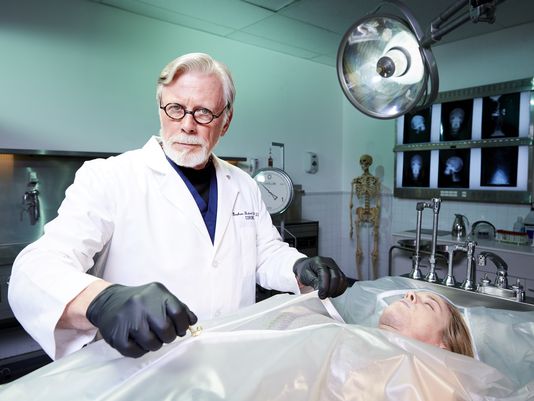Coroner ‘speaks for the dead’ in new Investigation Discovery TV series
Article originally published by: Flipsidepa.com
York College grad and Dauphin County Coroner Graham Hetrick explores murder investigations in a new Investigation Discovery series.
Every morning when Graham Hetrick wakes up, he gets in his car and drives to an office where he faces mortality.
That’s the never-ending job of the Dauphin County Coroner. And working with dead bodies and investigating deaths comes with the territory.
But if you ask Hetrick, a York College graduate, what he does every day, he’ll tell you he speaks for the dead, which is the premise of his new eight-part forensic TV series premiering Monday on Investigation Discovery.
“The Coroner: I Speak for the Dead” takes audiences inside complex forensic investigations and murder cases from Hetrick’s 25 years as Dauphin County Coroner, according to a news release.
Each episode – filmed in central Pennsylvania and Los Angeles – focuses on a different adjudicated homicide case from Hetrick’s files, ranging from serial killings to decades-old missing person cases to crimes of passion.
“I wanted to express to the people I serve what we do as medical investigators and the role of the coroner,” Hetrick said, adding that it’s different from what you see on police TV shows.
The police work from the outside of a crime scene in and try to find clues among the living, he said. But a coroner searches for the truth among the dead.
“Through the study of the science of medical-legal death investigation, (we try) to speak for the person who can no longer speak for themselves and, in a way, bring consolation to the families and seek justice,” Hetrick said. “Sometimes we may have evidence that will free somebody who has been accused, and other times, we accumulate evidence that will bring justice through convicting the true perpetrator.”
The first episode, which premieres at 10 p.m. Monday, will explore the murder of a young mother who was beaten and shot in a Harrisburg neighborhood.
Another episode will delve into a serial killer case that spanned across several counties and states, including York County.
“The York Area Regional Police did a wonderful job in that case,” Hetrick said.
He wouldn’t go into further detail about the episode or when it will air, but said it will show the science behind his process of determining the cause and manner of death from the moment he’s introduced to the victim at the crime scene through the entire investigation.
Hetrick – who teaches forensics and anatomy at the Harrisburg University of Science and Technology – will also follow up each episode with a corresponding essay that explores the forensic science behind each investigation on a deeper level. The essays can be found at CrimeFeed.com.
But aside from giving the public a lesson on forensic science, Hetrick said his goal is to help people look at death from a new perspective.
“I think it’s important that we start asking the deeper questions about issues that we all confront within society today,” he said. “If we look at how people die, we can figure out how we should live.”
(Photo: Courtesy of Investigation Discovery)




